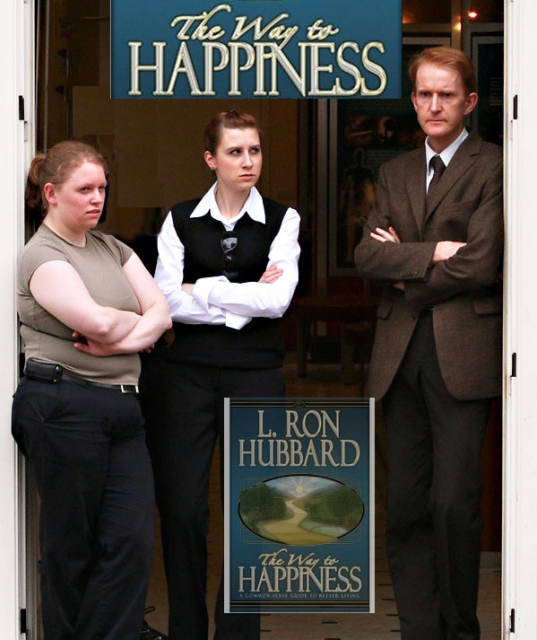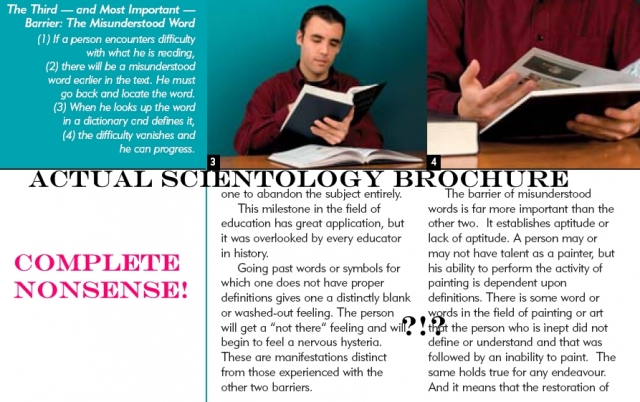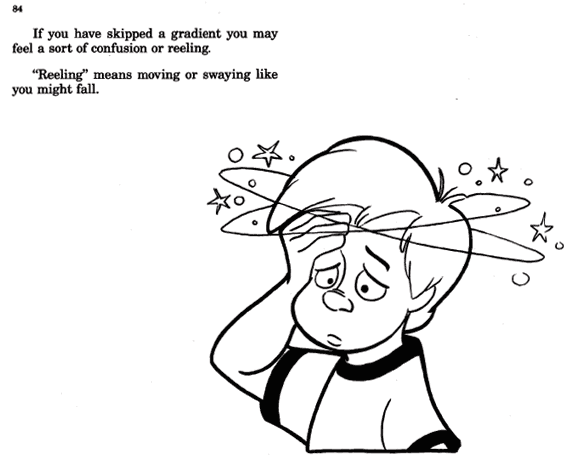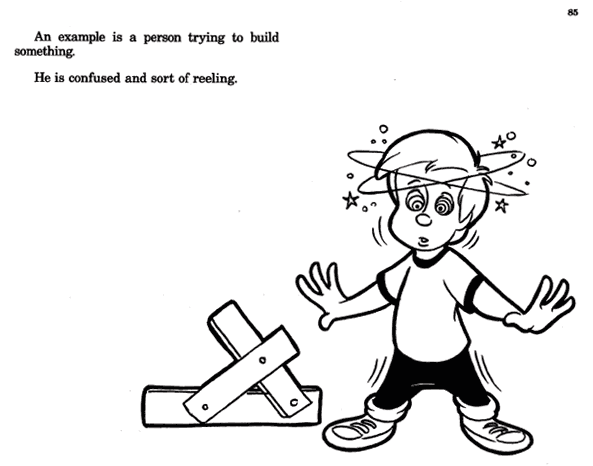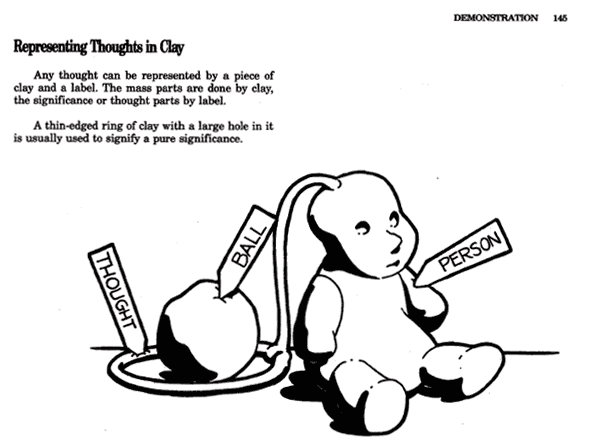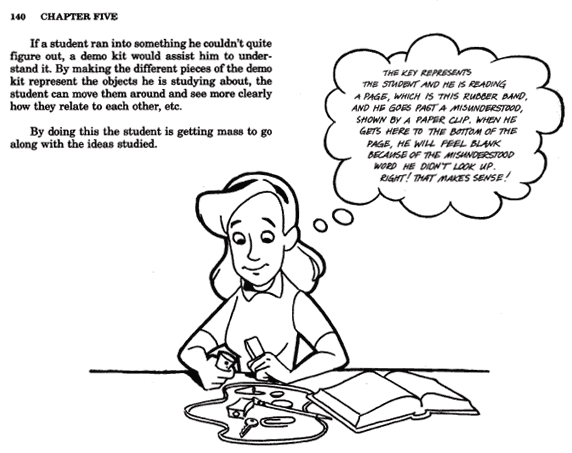Scientology "Study Tech": Start the brainwashing early
David Touretzky, PhD, is Professor of
Computer Science at Carnegie Mellon University in Pittsburgh, USA. He
is a long-time critic of the Scientology cult, and in 2003 wrote an
exceptionally useful essay about Study Tech: "The Hidden Message in L. Ron Hubbard's "Study Tech." Touretzky's analysis explains
not only the hidden Scientology doctrine within Study Tech, but also
addresses the question of whether or not it is effective. (SPOILER:
It's not effective.) Touretzky says that Study Tech "was designed
for indoctrination, not education. While it may be good at producing
obedient Scientologists, it is completely at odds with promoting the
ability to think independently. It quite deliberately aims to reduce
a student's ability to think critically. Students are taught to distrust
their own intelligence and background knowledge, passively and uncritically
accepting whatever they are being told."
The Principles
Study Tech is founded on three principles.
"Mass," "Gradients," and "Misunderstoods."
All three terms are very significant in the Scientology cult. Touretzky
cites the Study Tech materials in their claim that ONLY pictures can
provide the "mass" required to understand a concept.
"If you are studying about tractors, words on a page or someone telling you about tractors is no substitute for having an actual tractor there. Photographs or motion pictures are helpful because they at least give the hope of the mass of a tractor."
(Study Skills for Life, p. 21.)
'But reading books or listening to someone talk does not give you mass."
(Learning How to Learn, p. 70).
Study Tech books claim that several "nonoptimum
physical reactions" are associated with "absence of mass."
Such an absence of mass can actually make a student feel squashed. It can make him feel bent, sort of spinny, sort of dead, bored, and exasperated.
(Basic Study Manual, pp. 25-30)
Scientology teachers are quick to declare
that a bored or exasperated student may have learning difficulties.
With regard to "Gradient,"
a definition comes from Scientology's official glossary:
"Gradient: a gradual approach
to something, taken step by step, level by level, each step or level
being, of itself, easily surmountable -- so that, finally, quite complicated
and difficult activities or high states of being can be achieved with
relative ease. This principle is applied to both Scientology processing
and training."
The very same definition is given in
the Study Tech glossary, only omitting the final sentence. Touretzky
explains how Scientology "turns this sensible advice into rigid
dogma, with a warning that violations can have unpleasant consequences."
For example, one finds a cartoon with
a picture of a boy who skipped a step in building a dog-house, and now
he is seeing stars and feeling woozy. "If you have skipped a gradient
you may feel a sort of confusion or reeling" (Learning How to Learn,
p. 84.)
Touretzky notes: "Within Scientology,
the gradient doctrine is an important tool for controlling the flow
of information. It discourages beginning students from looking too closely
into Scientology's claims. Students are told to accept things on trust
and to wait until they are deemed ready for the facts. This is the bait
used to attract many a new member."
On the principle of "Misunderstoods,"
I will cite Touretzky at length:
The third principle of Study Tech
centers on the concept of misunderstood words. They're called "misunderstoods"
in the books, and abbreviated as M/U or Mis-U in Scientology. Misunderstoods
can be "cleared" by looking up the word in a dictionary. This
is fine as far as it goes; students should certainly learn to use a
dictionary. But according to Hubbard, misunderstood words are not a
minor problem; they are in fact "the most important barrier to
study" (Learning How to Learn, p. 101; Basic Study Manual, p. 49),
and "the only reason a person would stop studying or get confused
or not be able to learn" (Learning How to Learn, p. 114; Basic
Study Manual, preface). In fact, "THE ONLY REASON A PERSON GIVES
UP A STUDY OR BECOMES CONFUSED OR UNABLE TO LEARN IS BECAUSE HE HAS
GONE PAST A WORD THAT WAS NOT UNDERSTOOD" (How to Use a Dictionary,
p. 282; capitalization as in the original.) This sentence also appears
in the frontmatter of all Scientology religious volumes.
This emphasis on the misunderstood
word, in isolation, turns common sense into irrational dogma. Students
are told explicitly that when they have a problem with understanding,
"It's not a misunderstood phrase or idea or concept, but a misunderstood
WORD" (Basic Study Manual, p. 153, emphasis as in the original.)
The Study Tech materials claim that a
single misunderstood word can cause a student to completely forget everything
read so far, or make them want to stop learning. Among other bizarre
notions, it can also cause "a sort of nervous hysteria."
Touretzky points out that "Study
Tech is also an effective method of social control in the classroom.
If one expresses disagreement with the material one is studying in Scientology,
that's taken as evidence of a misunderstood word. And each M/U must
be located and cleared before moving on to other material… All disagreement
is dismissed as misunderstanding -- a dangerous attitude for an educational
system to promote."
Touretzsky's incisive analysis of Study
Tech cannot well be summarized in the brief context of this article.
I really recommend that you read it yourself. I will finish with some assessments
of Study Tech by genuine authorities in the field of education (i.e.
not Scientology shills), quoted by several journalists, and cited by
Touretzky.
"In my opinion, they are involved
in the worst kind of deception. They make grandiose claims about the
effectiveness of their methods and materials ... with data that has
never been published in a legitimate educational research journal."
Scot Danforth, who oversees teacher education for the University of
Missouri at St. Louis.
===
They "violate everything we
know about how children learn, and appropriate pedagogy. In short, these
books should be carefully placed in the cylindrical file." Johanna
Lemlech, Professor of Education at the University of Southern California.
===
"In many cases, lack of comprehension
is not because of a misunderstood word," says Sidnie Myrick, who
leads a UCLA research group on early literacy, teaches a master's course
in reading at Cal State L.A., and also teaches a class of first, second
and third graders at Thomas Edison Elementary School in Glendale (she
was Glendale's 1993 Teacher of the Year). "In fact," she says,
"in many cases the student won't get the meaning until the material
is presented in a completely different way."
Myrick also finds the books' illustrations
"cutesy and condescending," the explanations "stilted
and manufactured," and study technology, all in all, "woefully
inadequate."
==
One member of the Los Angeles school
board is unimpressed. A former high school history teacher, David Tokofsky
calls the books "remedial" and says they would be of little
use to any but the lowest-performing students. "If you walked into
an eighth-grade class and tried to use these books on kids who are at
the proper level, you'd kill them," says Tokofsky, who coached
the Marshall High School Academic Decathlon team to a national championship
in 1987. "They're not even good comic books."
"The reading process is so complex,"
she said. The principles in Hubbard's three barriers to learning focus
primarily on reading at the word level.
===
"But there is a whole other
aspect of the reading process that is ignored," added Ms. Vogt,
who is a former president of the California Reading Association and
a past board member of the International Reading Association.
"For older readers, we sometimes
say, 'Skip a word you don't understand and try to gain comprehension
from the whole context,'" she said. "We don't say that for
young readers. But for older readers, it is extremely cumbersome to
try to attend to every word."
===
Victoria Purcell-Gates (now at Michigan
State University), who reviewed the Basic Study Manual, told NOW magazine
that the merits of study tech are suspect:
"There isn't anything new. It's
also sort of sketchy. What we know about teaching comprehension skills
and study skills is a little more complex."
Purcell-Gates says the program's
emphasis on use of the dictionary "is probably not the most effective
tool for learning word meanings, because dictionary definitions tend
to be very decontextualized. Teachers wouldn't use that as a primary
vehicle for teaching vocabulary."
See Also:
Scientology's
Study Technology
The Hidden Message in L. Ron Hubbard's "Study Tech"
Get Involved
If you'd like to help with maintaining or developing the website, contact us.
Publish
Publish your stories and upcoming events on Indybay.


